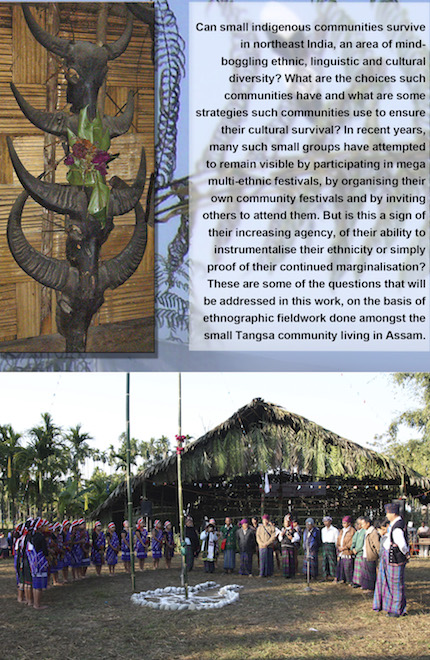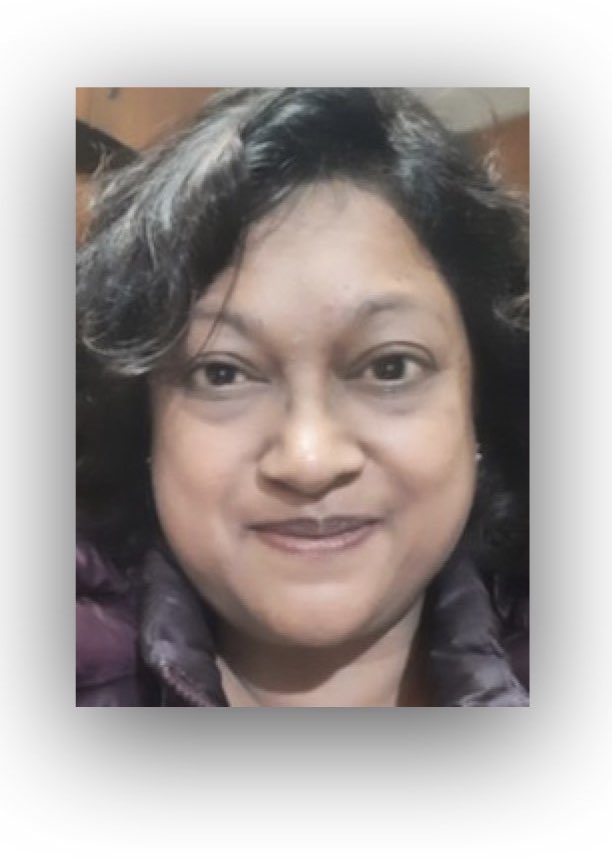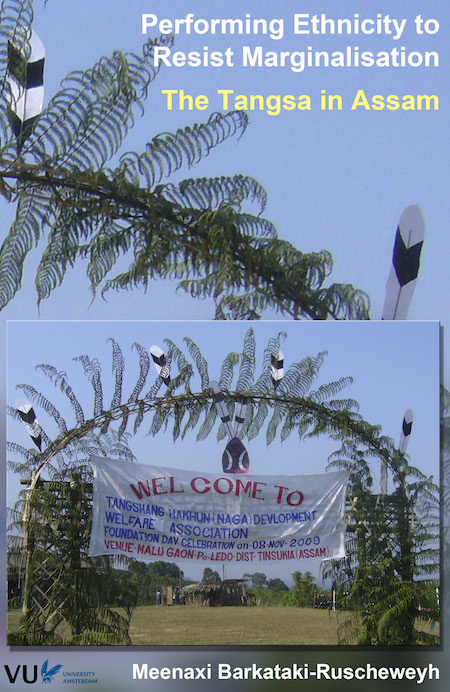
From Ritual to Performance: The Transformation of a Tangsa Festival in Assam, North-east India
Meenaxi Barkataki-Ruscheweyh, University of Göttingen
Tangsa is an umbrella term for a collection of small ethnic groups (related to the Naga) who have migrated to India from Myanmar probably within the last couple of centuries and have settled in the north-east Indian states of Assam and Arunachal Pradesh. In the last few decades, rapid changes have occurred to their lifestyles and to their traditional practices as a result of their migration down from the hills to the plains and their acceptance of the ‘modern’ way of life in the Indian state.
Furthermore, conversion of most of the Tangsa population to Christianity has implied giving up many of their old cultural practices. The newly converted Christian Tangsa had initially believed that religion could suffice as culture, but many have understood now that it cannot help them secure their ethnic identity. On the other hand, the few non-Christian Tangsa still left have also realised that putting religious divide before ethnic unity could lead to their annihilation. Therefore, there have been intense efforts in recent years, on the part of both groups, to come together to jointly celebrate a ‘traditional’ festival, in an attempt to create a common pan-Tangsa identity.
In this paper I wish to take a closer look at the Wihu-kuh festival organised jointly by all the Tangsa living in Assam in 2010 in the light of smaller festivals organised by the non-Christian Tangsa in earlier years, to observe the compromises that have been made from both sides in order to bring the Christian Tangsa back into the fold. The exercise of finding common shared ground has led to identity being ‘performed’. The factors determining the final form of the festival and the impact this representation has on the Tangsa self-image and their projected identity will also be discussed. In doing so, I hope to illustrate that the new Tangsa identity has been consciously fashioned in a form which not only enables internal consolidation but which also bolsters the social and political position of the Tangsa in the wider world around them. Their principal aim is to project a new multi-faceted identity which draws both from their traditional ethnic past and from their modern multi-religious present.
Source: Georg-August-Universität Göttingen – Meenaxi Barkataki-Ruscheweyh
Address: https://www.uni-goettingen.de/de/meenaxi-barkataki-ruscheweyh/304017.html
Date Visited: Wed Oct 21 2015 10:23:35 GMT+0200 (CEST)

“[A] common perception of conversion, prevalent in India, is that all conversions take place only among deprived lower caste or tribal groups, which are considered more susceptible to allurement or coercion. The reality of upper caste conversions is ignored in this climate of cynicism.”– Dr. Ivy Imogene Hansdak in Pandita Ramabai Saraswati: the convert as ‘heretic’ | More about the effects of “casteism” >>

Also read the following article by Meenaxi Barkataki-Ruscheweyh (free download):
Performing Identity: The Transformation of a Tangsa Festival in Assam, Northeast India >>
Georg-August University of Göttingen
This article looks at the Wihu kuh festival, which was celebrated by the Tangsa living in Assam in 2010 as their “traditional” festival in an attempt to create a common pan-Tangsa identity.
[Endnote 1. “I use the word “performance” here in Turner’s (1969) or Schechner’s (1988) sense. Performative actions will be understood to be not just reproductive, but at the same time also reflexive and constitutive.”]
Tips
- Find more resources by typing “Tangsa tribal culture”, “Assam tribe festival”, “Arunachal Pradesh worship”, “Naga custom”, “Seven sisters tribal heritage” or any combination of keywords on related projects across India here: Search select periodicals >>
- Do the same on the Safe Search website >>
- Find a book title or author on the same subject in the WorldCat.org search field seen below
Find publications by reputed authors (add “open access” for freely downloadable content)
Tips for using interactive maps
Toggle to normal view (from reader view) should the interactive map not be displayed by your tablet, smartphone or pc browser
For details and hyperlinks click on the rectangular button (left on the map’s header)
Scroll and click on one of the markers for information of special interest
Explore India’s tribal cultural heritage with the help of another interactive map >>
“The uniqueness of northeast states of India lies in their cultures” | Learn more >>
In Marginalised but not Defeated, Tarun Kanti Bose (a seasoned public interest journalist) “talks about the Khasis, Nagas, Karbis, Garos, Rabhas, Misings, Daflas, Bodos, Akas and others in the North-east. […] The mainstream development paradigm is being questioned and new rainbows of collective, community reassertions are happening across the tribal belt in India. More so, in most cases, led by brave, empowered and resilient women.” | Learn more: https://countercurrents.org/2023/05/book-review-marginalised-but-not-defeated >>
Up-to-date reports by Indian journalists and commentators
To search Indian periodicals, magazines, web portals and other sources safely, click here. To find an Indian PhD thesis on a particular tribal community, region and related issues, click here >>
Search tips
Combine the name of any particular state, language or region with that of any tribal (Adivasi) community.
Add keywords of special interest (music, poetry, dance just as health, sacred grove and biodiversity); learn about the rights of Scheduled Tribes such as the “Forest Rights Act” (FRA); and the United Nations “Declaration on the Rights of Indigenous Peoples”, “Universal Declaration of Human Rights”, “women’s rights”, or “children’s right to education”.
Ask a question that includes “tribal” or “Adivasi”, for instance: “Adivasi way of life better?” (or “tribal way of life worse?”)
Specify any particular issue or news item (biodiversity, bonded labour and human trafficking, climate change, ecology, economic development, ethnobotany, ethnomedicine, global warming, hunter-gatherers in a particular region or state, prevention of rural poverty, water access).
For official figures include “scheduled tribe ST” along with a union state or region: e.g. “Chhattisgarh ST community”, “Himalayan tribe”, “Scheduled tribe Tamil Nadu census”, “ST Kerala census”, “Particularly Vulnerable Tribal Group Jharkhand”, “PVTG Rajasthan”, “Adivasi ST Kerala”, “Adibasi ST West Bengal” etc.
In case the Google Custom Search window is not displayed here try the following: (1) toggle between “Reader” and regular viewing; (2) in your browser’s Security settings select “Enable JavaScript” | More tips >>
Note: hyperlinks and quotes are meant for fact-checking and information purposes only | Disclaimer >>